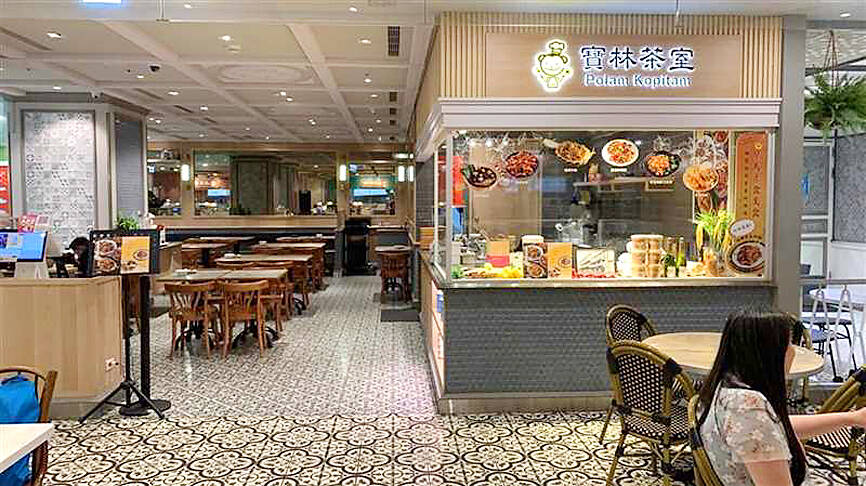The Taipei Department of Health yesterday said it has launched a probe into a restaurant at Far Eastern Sogo Xinyi A13 Department Store after a customer died of suspected food poisoning.
A preliminary investigation on Sunday found missing employee health status reports and unsanitary kitchen utensils at Polam Kopitiam (寶林茶室) in the department store’s basement food court, the department said.
No direct relationship between the food poisoning death and the restaurant was established, as no food from the day of the incident was available for testing and no other customers had reported health complaints, it said, adding that the investigation is ongoing.

Photo courtesy of the Taipei Department of Health
Later yesterday, however, it said the number of customers reporting illness had risen to five and it had ordered the restaurant to close until further notice.
On Friday last week, two New Taipei City residents had lunch together at the establishment before falling ill later that day, with one person showing symptoms at 8pm and the other at 8:10pm, the department said.
The following day, one of the people sought medical treatment at the Sanchong branch of New Taipei City Hospital and was transferred to Mackay Memorial Hospital in Taipei, where they died of kidney failure, it said.
The other person had slight food poisoning and their life was not in danger, it said.
The department opened a probe into the establishment after receiving a report on the incident from New Taipei City’s health authorities, it said.
The restaurant was warned that a second inspection is scheduled for today and failing it would result in a fine of NT$60,000 to NT$200 million (US$1,881 to US$6.27 million) under Article 44 of the Act Governing Food Safety and Sanitation (食品安全衛生管理法), the department said.
Samples collected from swabs of restaurant employees, kitchen utensils and the fecal matter of the two affected customers were being analyzed as part of the investigation, it said.
It would take further action should tests detect common pathogens across the samples to establish a direct link between the restaurant and the death, it said.

The manufacture of the remaining 28 M1A2T Abrams tanks Taiwan purchased from the US has recently been completed, and they are expected to be delivered within the next one to two months, a source said yesterday. The Ministry of National Defense is arranging cargo ships to transport the tanks to Taiwan as soon as possible, said the source, who is familiar with the matter. The estimated arrival time ranges from late this month to early next month, the source said. The 28 Abrams tanks make up the third and final batch of a total of 108 tanks, valued at about NT$40.5 billion

Two Taiwanese prosecutors were questioned by Chinese security personnel at their hotel during a trip to China’s Henan Province this month, the Mainland Affairs Council (MAC) said yesterday. The officers had personal information on the prosecutors, including “when they were assigned to their posts, their work locations and job titles,” MAC Deputy Minister and spokesman Liang Wen-chieh (梁文傑) said. On top of asking about their agencies and positions, the officers also questioned the prosecutors about the Cross-Strait Joint Crime-Fighting and Judicial Mutual Assistance Agreement, a pact that serves as the framework for Taiwan-China cooperation on combating crime and providing judicial assistance, Liang

A group from the Taiwanese Designers in Australia association yesterday represented Taiwan at the Midsumma Pride March in Melbourne. The march, held in the St. Kilda suburb, is the city’s largest LGBTQIA+ parade and the flagship event of the annual Midsumma Festival. It attracted more than 45,000 spectators who supported the 400 groups and 10,000 marchers that participated this year, the association said. Taiwanese Designers said they organized a team to march for Taiwan this year, joining politicians, government agencies, professionals and community organizations in showing support for LGBTQIA+ people and diverse communities. As the first country in Asia to legalize same-sex

MOTIVES QUESTIONED The PLA considers Xi’s policies toward Taiwan to be driven by personal considerations rather than military assessment, the Epoch Times reports Chinese President Xi Jinping’s (習近平) latest purge of the Chinese People’s Liberation Army (PLA) leadership might have been prompted by the military’s opposition to plans of invading Taiwan, the Epoch Times said. The Chinese military opposes waging war against Taiwan by a large consensus, putting it at odds with Xi’s vision, the Falun Gong-affiliated daily said in a report on Thursday, citing anonymous sources with insight into the PLA’s inner workings. The opposition is not the opinion of a few generals, but a widely shared view among the PLA cadre, the Epoch Times cited them as saying. “Chinese forces know full well that